Related Research Articles
Macbethad mac Findláech, nicknamed the Red King, was King of Scotland (Alba) from 1040 until his death. Little is known about Macbeth's early life, although he was the son of Findláech of Moray and may have been a grandson of Malcolm II. He became Mormaer (Earl) of Moray – a semi-autonomous province – in 1032, and was probably responsible for the death of the previous mormaer, Gille Coemgáin. He subsequently married Gille Coemgáin's widow, Gruoch, but they had no children together.
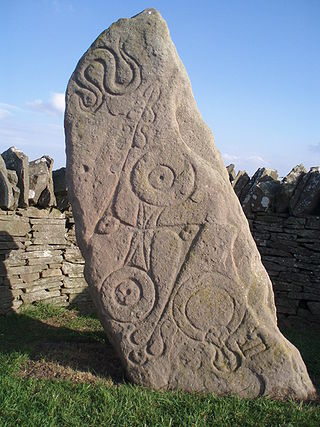
The Picts were a group of peoples who lived in Britain north of the Forth–Clyde isthmus in the Pre-Viking, Early Middle Ages. Where they lived and details of their culture can be inferred from early medieval texts and Pictish stones. The term Picti appears in written records as an exonym from the late third century AD, but was adopted as an endonym in the late seventh century during the Verturian hegemony. This lasted around 160 years until the succession of the Alpínid dynasty, when the Pictish kingdom merged with that of Dál Riata to form the Kingdom of Alba. The concept of "Pictish kingship" continued for a few decades until it was abandoned entirely as a contemporary signifier during the reign of Caustantín mac Áeda.
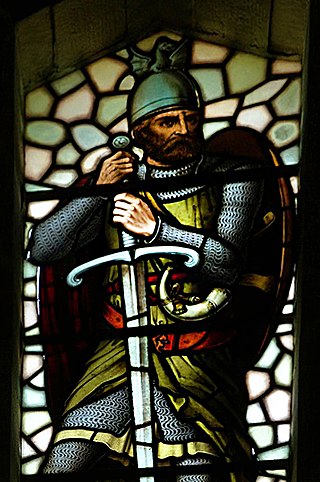
Sir William Wallace was a Scottish knight who became one of the main leaders during the First War of Scottish Independence.
The Battle of Falkirk, on 22 July 1298, was one of the major battles in the First War of Scottish Independence. Led by King Edward I of England, the English army defeated the Scots, led by William Wallace. Shortly after the battle Wallace resigned as Guardian of Scotland.

The history of the Scots language refers to how Anglic varieties spoken in parts of Scotland developed into modern Scots.

The Kingdom of Alba was the Kingdom of Scotland between the deaths of Donald II in 900 and of Alexander III in 1286. The latter's death led indirectly to an invasion of Scotland by Edward I of England in 1296 and the First War of Scottish Independence.

Scotland in the Middle Ages concerns the history of Scotland from the departure of the Romans to the adoption of major aspects of the Renaissance in the early sixteenth century.
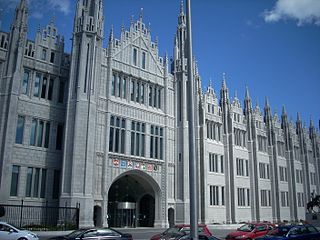
There are fifteen universities in Scotland and three other institutions of higher education that have the authority to award academic degrees.
Professor Richard D. Oram F.S.A. (Scot.) is a Scottish historian. He is a professor of medieval and environmental history at the University of Stirling and an honorary lecturer in history at the University of Aberdeen. He is also the director of the Centre for Environmental History and Policy at the University of Stirling.
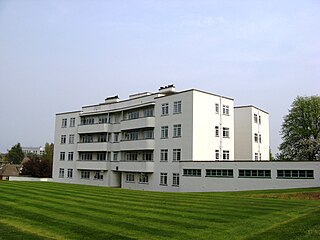
Ravelston is an area of Edinburgh, Scotland, to the west of the city centre, the east of Corstorphine and Clermiston, the north of Murrayfield, West End and Roseburn and to the south of Queensferry Road. Ravelston is often considered to be part of the larger neighbouring area of Murrayfield.
Rosalind Mary Mitchison FRSE was a 20th-century English historian and academic who specialised in Scottish social history. She was affectionately known as "Rowy" Mitchison.
Edward James Cowan FRSE was a Scottish historian.

Margaret Bennett is a Scottish writer, folklorist, ethnologist, broadcaster, and singer. Her main interests lies in the field of traditional Scottish folk culture and cultural identity of the Scots in Scotland and abroad. The late Hamish Henderson, internationally distinguished poet and folklorist, said about her: Margaret embodies the spirit of Scotland.

Clann Ruaidhrí was a leading medieval clan in the Hebrides and the western seaboard of Scotland. The eponymous ancestor of the family was Ruaidhrí mac Raghnaill, a principal member of Clann Somhairle in the thirteenth century. Members of Clann Ruaidhrí were factors in both the histories of the Kingdom of the Isles and the Kingdom of Scotland in the thirteenth- and fourteenth centuries. The family appears to have held power in Kintyre in the thirteenth century. By the fourteenth century, the family controlled an extensive provincial lordship stretching along north-western Scottish coast and into the Hebrides. As a leading force in the Kingdom of the Isles, the family fiercely opposed Scottish authority. With the collapse of Norwegian hegemony in the region, the family nimbly integrated itself into the Kingdom of Scotland.

Scotland in the Late Middle Ages, between the deaths of Alexander III in 1286 and James IV in 1513, established its independence from England under figures including William Wallace in the late 13th century and Robert Bruce in the 14th century. In the 15th century under the Stewart Dynasty, despite a turbulent political history, the Crown gained greater political control at the expense of independent lords and regained most of its lost territory to approximately the modern borders of the country. However, the Auld Alliance with France led to the heavy defeat of a Scottish army at the Battle of Flodden in 1513 and the death of the king James IV, which would be followed by a long minority and a period of political instability.
Michael Lynch, FRHistS, FRSE, FSA Scot is a retired Scottish historian and a leading expert in the history of the Scottish Reformation and pre-modern urbanisation in the Scottish kingdom. In 2010, five years after his retirement, he was described by one reviewer as 'one of the most influential historians in Scotland of the last thirty years', whose work has been characterised by an 'ability to bring ecclesiastical, cultural and urban perspectives to traditional Scottish political and governmental histories', as well as the ability 'to clarify a difficult theory within a deceptively simple phrase'.
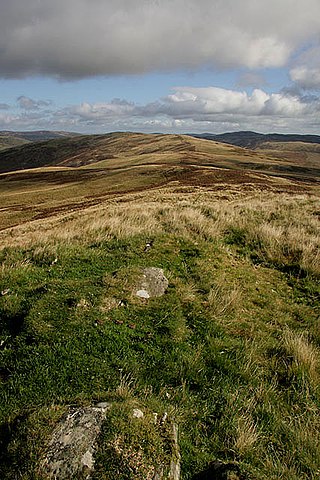
The geography of Scotland in the early modern era covers all aspects of the land in Scotland, including physical and human, between the sixteenth century and the beginnings of the Agricultural Revolution and industrialisation in the eighteenth century. The defining factor in the geography of Scotland is the distinction between the Highlands and Islands in the north and west and the Lowlands in the south and east. The Highlands were subdivided by the Great Glen and the Lowlands into the fertile Central Lowlands and the Southern Uplands. The Uplands and Highlands had a relatively short growing season, exacerbated by the Little Ice Age, which peaked towards the end of the seventeenth century.

Scottish literature in the Middle Ages is literature written in Scotland, or by Scottish writers, between the departure of the Romans from Britain in the fifth century, until the establishment of the Renaissance in the late fifteenth century and early sixteenth century. It includes literature written in Brythonic, Scottish Gaelic, Scots, French and Latin.

Literature in early modern Scotland is literature written in Scotland or by Scottish writers between the Renaissance in the early sixteenth century and the beginnings of the Enlightenment and Industrial Revolution in mid-eighteenth century. By the beginning of this era Gaelic had been in geographical decline for three centuries and had begun to be a second class language, confined to the Highlands and Islands, but the tradition of Classic Gaelic Poetry survived. Middle Scots became the language of both the nobility and the majority population. The establishment of a printing press in 1507 made it easier to disseminate Scottish literature and was probably aimed at bolstering Scottish national identity.
William Ferguson was a Scottish academic and author who specialised in the history of Scotland. He studied history at Glasgow and Oxford, and spent most of his academic career at the University of Edinburgh. He retired from teaching in 1989, but continued his research and his writing, publishing The Identity of the Scottish Nation: An Historic Quest in 1998. He died on 8 January 2021, aged 96.
References
- ↑ "Staff: Prof Finlay Richard". University of Strathclyde. Archived from the original on 9 September 2014. Retrieved 8 September 2014.
- ↑ "Professor Richard Finlay and Dr Alison Cathcart: We need to open up about Scottish history". The Scotsman . 30 November 2011. Retrieved 8 September 2014.